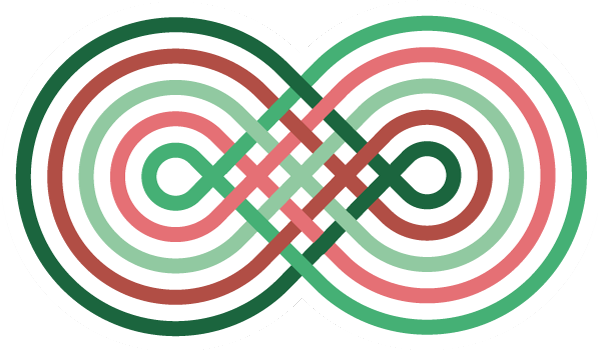


We are committed to building a world that reflects all of our inherent belonging.
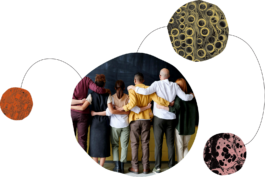
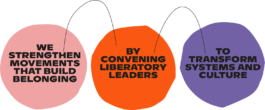
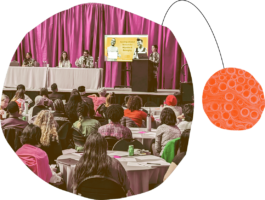
We believe that transformation can only happen through powerful social movements made up of not just activists but people from a diverse range of sectors - across skill sets, issue areas, identities and modalities. We also believe that the old “us vs. them” worldview will never get us to true transformative change. We therefore work to strengthen broad-based movements that see separation and injustice itself–rather than any individuals–as the “enemy.” Our goal is to build a world where everyone’s inherent belonging–human and otherwise–is remembered, honored, and reflected in our systems, structures and cultures.
We view leadership less as a role that people play and more as the wide set of skills necessary to build a better world. These skills are held by countless individuals: from grassroots organizers working in their neighborhoods to institutional leaders working in international agencies, from visionary artists who operate in cultural spaces to intellectuals working in academia. We aim to honor and lift up a wider variety than what we typically see., We see “liberatory leaders” as people who have the capacity to envision the world we want to create, a strong analysis of systemic oppression. Liberatory leaders are committed to practicing ways of being, relating, and embodying transformation in their own lives, relationships, and work.
We aim not only to change laws and policies, but to impact a deeper transformation of relationships–to ourselves, each other and to the earth. We recognize that systems and cultures influence each other in ongoing and dynamic ways. Therefore, a strategy that addresses one without the other will not lead to transformation. We can change laws and policies, but those laws and policies are practiced by people who are embedded in cultures of separation and violence. At the same time, we can change cultural norms, but there are structures put in place to keep us separated and keep certain communities marginalized. Our initiatives aim to transform both systems and cultures so that more and more of us can be held in a container of belonging.
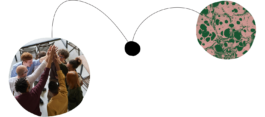
Building Belonging’s mission is about transforming systems and culture-: we start by choosing a system we seek to transform. This choice is informed through the prism of an assessment of need and whether the conditions are ripe for the system to be open to transformation, our Principles, as well as our personal connection to the system and the relationships we have with key people.
We partner with “liberatory leaders”: people who are committed to practicing ways of being, relating, and embodying the transformation we seek in the world. We work to identify a diverse fractal of such leaders who are representative of the system we are seeking to transform.
We bring together those liberatory leaders who together have wisdom and power to transform the given system. Convening for us is about co-creating a container of belonging: connecting people to each other, nurturing relationships, and visioning together so that transformation is embodied.
After vision comes practice: we practice the skills necessary to bring our vision into reality, and achieve the transformation we seek. We consider Building Belonging a “future dojo”: a place to practice what we want to become, and to incubate strategies for how to get there from here. This work is ongoing beyond convenings, as we continue to deepen relationships and collaborations through practice.
Based on shared vision, relationships, embodied practice and learning, we collaborate on strategy. We choose interventions that reflect our unique strengths, an understanding of the system, and that feel catalytic and likely to bring us collectively closer to a world where everyone’s inherent belonging is reflected.
We are committed to building a world that reflects all of our inherent belonging.



We believe that transformation can only happen through powerful social movements made up of not just activists but people from a diverse range of sectors - across skill sets, issue areas, identities and modalities. We also believe that the old “us vs. them” worldview will never get us to true transformative change. We therefore work to strengthen broad-based movements that see separation and injustice itself–rather than any individuals–as the “enemy.” Our goal is to build a world where everyone’s inherent belonging–human and otherwise–is remembered, honored, and reflected in our systems, structures and cultures.
We view leadership less as a role that people play and more as the wide set of skills necessary to build a better world. These skills are held by countless individuals: from grassroots organizers working in their neighborhoods to institutional leaders working in international agencies, from visionary artists who operate in cultural spaces to intellectuals working in academia. We aim to honor and lift up a wider variety than what we typically see., We see “liberatory leaders” as people who have the capacity to envision the world we want to create, a strong analysis of systemic oppression. Liberatory leaders are committed to practicing ways of being, relating, and embodying transformation in their own lives, relationships, and work.
We aim not only to change laws and policies, but to impact a deeper transformation of relationships–to ourselves, each other and to the earth. We recognize that systems and cultures influence each other in ongoing and dynamic ways. Therefore, a strategy that addresses one without the other will not lead to transformation. We can change laws and policies, but those laws and policies are practiced by people who are embedded in cultures of separation and violence. At the same time, we can change cultural norms, but there are structures put in place to keep us separated and keep certain communities marginalized. Our initiatives aim to transform both systems and cultures so that more and more of us can be held in a container of belonging.

Building Belonging’s mission is about transforming systems and culture-: we start by choosing a system we seek to transform. This choice is informed through the prism of an assessment of need and whether the conditions are ripe for the system to be open to transformation, our Principles, as well as our personal connection to the system and the relationships we have with key people.
We partner with “liberatory leaders”: people who are committed to practicing ways of being, relating, and embodying the transformation we seek in the world. We work to identify a diverse fractal of such leaders who are representative of the system we are seeking to transform.
We bring together those liberatory leaders who together have wisdom and power to transform the given system. Convening for us is about co-creating a container of belonging: connecting people to each other, nurturing relationships, and visioning together so that transformation is embodied.
After vision comes practice: we practice the skills necessary to bring our vision into reality, and achieve the transformation we seek. We consider Building Belonging a “future dojo”: a place to practice what we want to become, and to incubate strategies for how to get there from here. This work is ongoing beyond convenings, as we continue to deepen relationships and collaborations through practice.
Based on shared vision, relationships, embodied practice and learning, we collaborate on strategy. We choose interventions that reflect our unique strengths, an understanding of the system, and that feel catalytic and likely to bring us collectively closer to a world where everyone’s inherent belonging is reflected.